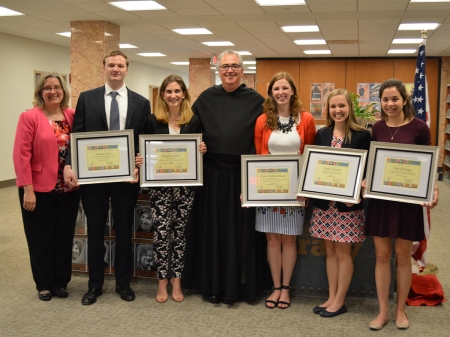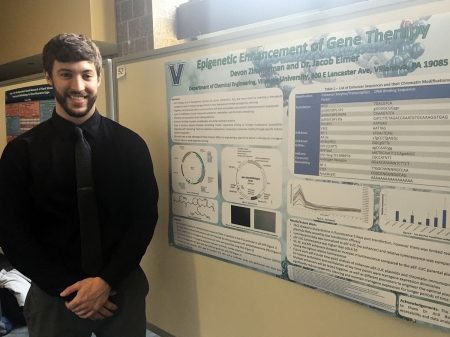Engineers Receive Recognition for Research
April 15–25, 2016, marked the third annual Villanova Spring Research Expo, a weeklong series of events celebrating the scholarly achievements of the University's researchers—undergraduates, graduate students and faculty. In addition to college-specific presentations, the week also included the campus-wide Falvey Scholars presentation and Sigma Xi Student Research Poster Symposium.

Ms. Millicent Gaskell, Director of Falvey Library and University Librarian, with Falvey Scholar Award winners Thomas Cox ’16 COE; Meghan Barker ’16 CLAS; University President The Rev. Peter M. Donohue, OSA, PhD, ’75 CLAS; Chloe DeEntremont’16 CLAS; Molly Purnell ’16 CON; and Tara Malanga ’16 CLAS. Credit: Alice Bampton, digital image specialist and senior writer, Falvey Memorial Library. Credit: Alice Bampton, digital image specialist and senior writer, Falvey Memorial Library
Falvey Scholars Award Presentation
The Falvey Scholars Award is an annual program established by Falvey Library to recognize outstanding undergraduate research across Arts, Sciences, Engineering, Nursing and Business.
Winning the award for both the College of Engineering and Villanova School of Business was Thomas Cox ’16, a Mechanical Engineering major with a minor in Business and Honors. Thomas was recognized for “Measuring the Adoption and Deployment Rates of Disruptive Business Technologies,” research he conducted with VSB faculty member Stephen Andriole, PhD, Thomas G. Labrecque Professor of Business Technology. The purpose of their research, he says, is “to understand how companies identify, pilot and deploy specific emerging or ‘disruptive’ technologies.” A disruptive technology is defined as “an innovation that creates a new market and value network and eventually disrupts an existing market and value network, displacing established market leaders and alliances." Thomas explains that companies want to use these new technologies for a number of reasons, but, “It really all just boils down to improving/making their business more efficient and competitive.”
After graduation, Thomas will be working for a boutique strategy consulting firm in New York where he hopes to use his knowledge of technology trends and market disruption to help advise upper level management at Fortune 100 companies.

PhD candidate Devon Zimmerman won the Sigma Xi award for his poster “Epigenetic Enhancement of Gene Therapy.”
Sigma Xi Student Research Poster Symposium
Sigma Xi is the international honor society for research scientists and engineers. Each year, the Villanova chapter sponsors a poster symposium to recognize and celebrate students’ work. This year featured 63 posters across the areas of Astronomy and Astrophysics, Biochemistry, Chemistry, Biology, Computer Science, Physics, Math, Psychology and Engineering.
In the College of Engineering, 13 undergraduates and nine graduate students presented a combined 14 posters. Taking the honors was PhD student Devon Zimmerman, a 2013 biochemistry graduate from West Chester University. In “Epigenetic Enhancement of Gene Therapy” Zimmerman addresses the epigenetic silencing of transgenes that limit gene therapy systems. In gene therapy, genetic diseases are treated by inserting therapeutic transgenes that replace or repair mutated DNA. Epigenetics silencing refers to modifications to DNA or nucleosomes that transform activated genes to repressed genes. “My focus,” says Zimmerman, “is to specifically engineer a plasmid that can significantly reduce epigenetic silencing in vitro by screening different enhancer sequences inserted upstream of promoters to improve transgene expression.”
Zimmerman notes that his research is relatively new, but as he gathers more data, he and his advisor, Assistant Professor of Chemical Engineering Jacob Elmer, PhD, plan to present their work at a number of conferences.
